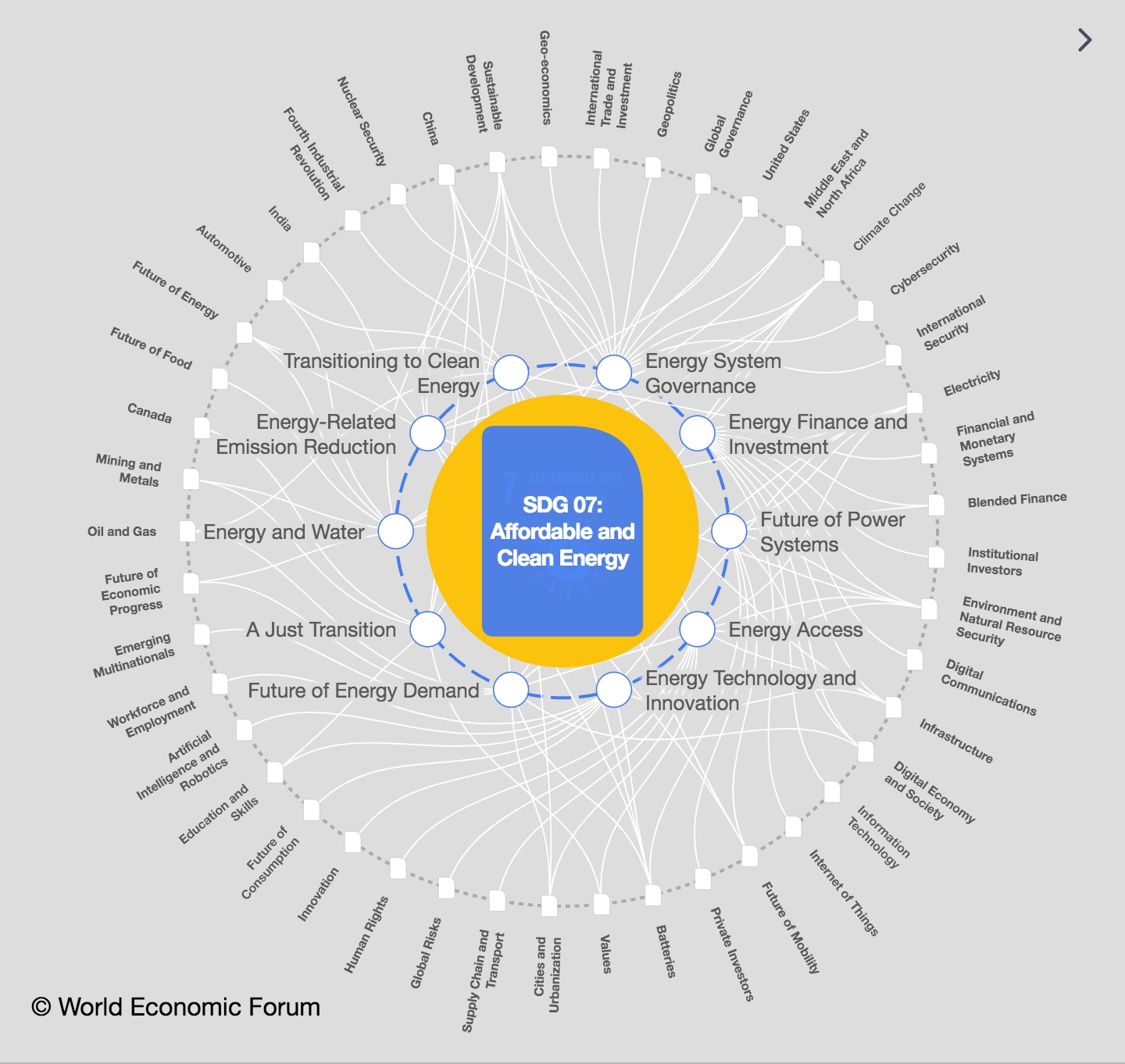Energy transition: Which countries are making most progress in 2023 – and which have more work to do?

European countries continue to populate the top 10. Image: Unsplash/NASA

Get involved with our crowdsourced digital platform to deliver impact at scale
Stay up to date:
SDG 07: Affordable and Clean Energy
- The Green Future Index 2023 ranks countries’ progress on developing a sustainable, low-carbon future.
- Uruguay, Indonesia and Argentina have climbed the rankings significantly since 2022 thanks to sustainable policy action.
- The World Economic Forum’s Mobilizing Investments for Clean Energy in Emerging Economies initiative is helping unlock clean energy investment opportunities.
How green is your country? Is it embracing more sustainable ways of doing things? If so, how does it compare to other nations around the world?
Here’s your chance to find out. The Green Future Index 2023 is the latest version of an annual report that ranks 76 nations and territories on their progress and commitment to building a low-carbon future.
Now in its third edition, the report shows which economies are leading the charge, which have improved most and which still have work to do to get on track.
The index scores each country across five pillars: carbon emissions; energy transition; green society; clean innovation; and climate policy. The scores are then aggregated to determine each nation’s ranking.

Green movers and shakers
There has been relatively little change in the nations topping the index – those that lead, continue to lead, the report notes. Momentum to improve has slowed among leading nations, however.
European countries continue to populate the report’s top 10, with eighth-placed South Korea the only non-European nation to feature.
It’s a different story in the middle of the index, however, with a number of countries putting sustainable policy into action and seeing their index scores improve substantially.
Many in this group are characterized by strong export economies. Uruguay has made real progress in efforts to clean-up its economy, climbing to 26th from 38th in last year’s index. Agriculture and forestry account for a sizeable proportion of its exports … and almost 75% of its CO2 emissions.

South Africa climbed to 25th place from 31st last year, as the country’s National Treasury advanced a Green Finance Taxonomy and established standards for sustainable economic activities to encourage foreign investment.
Developing nations getting greener
The Green Future Index 2023’s findings show that a country’s economic wealth contributes significantly to its ability to drive towards a low-carbon future. However, economics is not the only factor.
In total, 35 countries improved their score compared with last year’s report, and 17 of those were poorer countries.
What's the World Economic Forum doing about the transition to clean energy?
Argentina and Indonesia saw the biggest gains of any country. Argentina climbed 20 places to 48th position, largely by improving its green society score. The country’s growing nuclear power capacity helped reduce its demand for fossil fuels.
Indonesia gained 21 places to rank 49th overall by reducing its carbon emissions. A $56 million finance package from Norway helped promote emissions reductions and preserve Indonesia’s tropical rainforests.
Big economies are making an impact
However, the performance of major economies with large populations – such as China (ranked 27), Brazil (ranked 38) and India (ranked 50) – have more of an impact overall than smaller nations.
While all three economies saw their index score fall slightly compared with last year, there are positive signs.
China is one of the world’s biggest greenhouse gas emitters, producing just under a third of total global CO2 emissions. However, it ranks 17th out of 120 countries on the World Economic Forum’s Energy Transition Index (ETI) – part of the Fostering Effective Energy Transition 2023 report – as it has made significant progress on developing its renewable energy capacity over the past decade.
More than a quarter of China’s electricity came from renewable sources in 2021, leaving it within reach of its target of 33% by 2025.
Brazil – the world’s ninth-largest economy – ranks 14th on this year’s ETI and its overall scores have improved significantly since 2014. With a high share of renewables in the energy mix, Brazil’s electricity sector is one of the least carbon-intensive in the world.
India’s ETI performance has been steadily improving over the past 10 years and it now ranks 67th, largely due to efforts to achieve universal access to electricity, replacing solid fuels with clean cooking options and increasing renewable energy deployment. The government has approved a Sovereign Green Bonds Framework to help investment in developing green energy infrastructure.

Unlocking clean energy potential
Developing nations often have additional challenges to overcome compared with developed economies when looking to decarbonize, such as lower levels of infrastructure, less widespread power and distribution networks, and a lack of investment.
The World Economic Forum’s Mobilizing Investments for Clean Energy in Emerging Economies initiative aims to help countries overcome challenges like these and transition to clean energy. Nigeria is a good example of this programme in action.
Nigeria’s growing population has led to its energy demand soaring, but the country requires approximately $410 billion by 2060 to achieve the energy access and transition targets set out in its energy transition plan.
However, Nigeria’s abundant and untapped renewable resources could provide up to 60% of its required energy demand by 2050, according to the International Renewable Energy Agency.
The initiative’s partners are exploring opportunities for Nigeria to unlock clean energy investment opportunities, by encouraging public and private-sector actors to look at ways to accelerate investments, particularly in priority areas.
Progress is being made on the global transition to clean energy. The Forum’s Fostering Effective Energy Transition 2023 report notes that 95% of countries have improved their total Energy Transition Index score over the past decade, with the biggest energy consumers also making the biggest leaps forward.
“In the coming decades, our focus and investments must shift towards accelerating progress in densely populated developing nations, where financial and technological constraints hinder the full realization of their renewable energy potential,” says Roberto Bocca, Head of the Centre for Energy and Materials at the World Economic Forum. “This must go hand in hand with efforts to enhance the energy efficiency of their economies and reduce the carbon intensity of their energy mix. By fostering increased collaboration and targeted support, we can pave the way for a more equitable, secure and sustainable future."
While there are significant signs of progress, more urgent action is needed globally to accelerate the energy transition and put the world on course to achieve net-zero emissions.
Don't miss any update on this topic
Create a free account and access your personalized content collection with our latest publications and analyses.
License and Republishing
World Economic Forum articles may be republished in accordance with the Creative Commons Attribution-NonCommercial-NoDerivatives 4.0 International Public License, and in accordance with our Terms of Use.
The views expressed in this article are those of the author alone and not the World Economic Forum.
The Agenda Weekly
A weekly update of the most important issues driving the global agenda
You can unsubscribe at any time using the link in our emails. For more details, review our privacy policy.
More on Energy TransitionSee all
Robin Pomeroy and Sophia Akram
April 26, 2024
Liam Coleman
April 25, 2024
Tarek Sultan
April 24, 2024
Jennifer Holmgren
April 23, 2024








